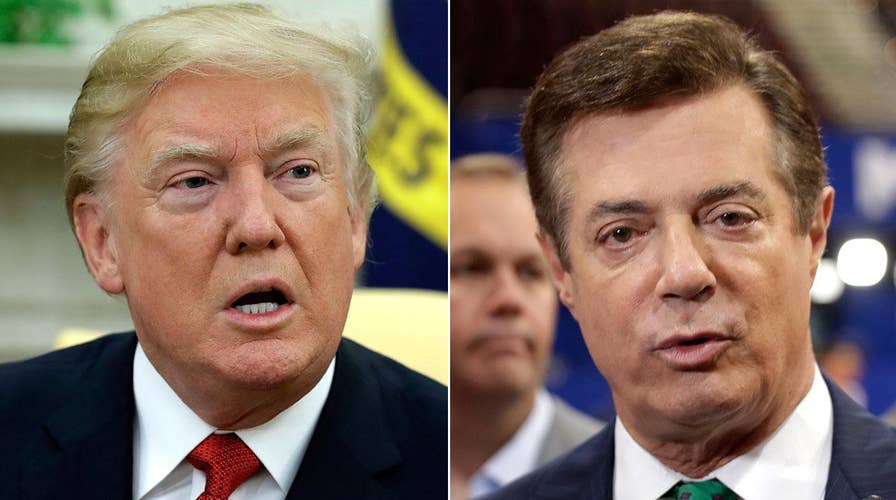It's Paul Manafort's indictment, not Trump's
Fox News contributor Tammy Bruce weighs in on 'Fox & Friends First.'
The federal jury that found former Trump presidential campaign chairman Paul Manafort guilty of eight counts of tax evasion and bank fraud Tuesday reached the appropriate verdict, based on convincing evidence assembled by prosecutors working for Special Counsel Robert Mueller.
A mistrial was declared on 10 other counts when jurors couldn’t agree on verdicts on those charges.
The eight guilty verdicts will give Mueller’s team investigating Russian interference in the 2016 presidential campaign needed momentum. Mueller did not seem to be making much progress of late. He can now count Manafort’s conviction as a major victory – along with a guilty plea he elicited earlier from President Trump’s former national security adviser, Michael Flynn.
Yet Manafort’s trial and conviction in U.S. District Court in Alexandria, Virginia, reveal nothing of substance about allegations that the Russian government worked with Donald Trump and his presidential campaign in 2016 to help Trump defeat Democrat Hillary Clinton in the race for the White House.
Mueller’s office was created to investigate this alleged conspiracy – referred to as “collusion” by President Trump, who states almost daily that “there was no collusion.”
But as Mueller’s investigation widened based on new information that prosecutors and FBI agents picked up, evidence emerged about Manafort’s business activities going back to 2006 – years before he joined the Trump campaign for five months in 2016.
According to prosecutors, Manafort was paid $60 million from Ukraine’s then-President Viktor Yanukovich and his political allies. After stashing the money away in offshore bank accounts without paying taxes, Manafort secretly moved at least $15 million into the United States to fund a lavish lifestyle, prosecutors told jurors.
So none of Manafort’s activities that he stood trial for had anything to do with Trump, or even American presidential politics. They instead centered on the squalid efforts of influence-peddler Manafort to hide payments from Ukrainian politicians.
Manafort’s political consulting, such as it was, did not violate federal law. Only his efforts to hide his income from the Internal Revenue Service were at issue. The bottom line: the case against him was about whether he cheated on his taxes – not about Russian election interference.
The specific nature of the charges against Manafort reveals their limits. Trump went virtually unmentioned in the trial. Prosecutors did not raise Russia’s efforts to interfere in the 2016 elections.
While Mueller may have targeted Manafort for prosecution in the hopes that he would cooperate to reveal alleged criminal activity by Trump, that issue went unaddressed at the Manafort trial.
Even if Manafort’s financial misdeeds had rendered him vulnerable to blackmail from Ukrainians or Russians, the charges of tax evasion did not allow that potential link to 2016 election meddling to arise.
Documents alone confirmed Manafort’s guilt. The political consultant did not testify or even provide an affirmative defense.
Manafort’s lawyers focused their strategy on attacking the prosecution’s star witness and Manafort’s former right-hand man – Rick Gates. After Gates testified against Manafort and accused him of breaking the law, Manafort’s lawyers claimed that Gates stole from Manafort to fund his own expensive luxuries and said Manafort was a victim.
It was as if Batman and Robin turned on each other, each saying his partner had embarked on a life of crime.
After four days of deliberations, the jury agreed with prosecutors on much of their case, despite their inability to agree whether Manafort was guilty or innocent on 10 of the 18 charges against him.
Perhaps just as important as the verdict is what it means for the future of the Mueller investigation.
U.S. District Judge T.S. Ellis III could well sentence Manafort to spend the rest of his life in prison. That prospect gives Manafort a strong incentive to cooperate with Mueller, in the hopes of receiving a lighter sentence.
Manafort may know of communications between the Trump campaign and Russians over the theft and release of the Clinton campaign’s emails in 2016 or other matters. If Manafort now starts cooperating with Mueller, Mueller may have just gained some powerful ammunition in his ongoing investigation of the Trump campaign.
On the other hand, Manafort may know nothing because there is nothing to the collusion charges. In that case, Manafort may be trying to show his loyalty to President Trump in order to win a presidential pardon.
President Trump may have given Manafort reason to hope for a pardon with his frequent attacks on the Mueller investigation, which he regularly calls “a rigged witch hunt.”
But if President Trump believes that Mueller’s investigation has gone too far, he should not resort to the pardon power to cure it.
Manafort was plainly guilty of tax evasion, on a large scale – TurboTax did not just make a $15 million error on his 1040.
Instead, President Trump can stop prosecutorial abuse either by ordering Mueller to curb his investigation or even firing the special counsel and replacing him. But a pardon of Manafort would seem purely political, in contrast earlier pardons granted by Trump to defendants who had arguably been sentenced to punishments wholly out of proportion to their alleged wrongdoing.
While the Constitution places few limits on presidential pardons, President Trump should not use a valuable tool of executive power to protect a political crony.
Mueller’s victory in convicting Manafort may also place more pressure on other figures in the Russia investigation. Any threats that the special counsel may make to win their cooperation will have now have renewed credibility.
And Manafort faces another trial in U.S. District Court in the District of Columbia in September on additional charges brought by Mueller. A conviction in that case would put still more pressure on Manafort to cooperate with Mueller’s investigation and turn on the president.









































